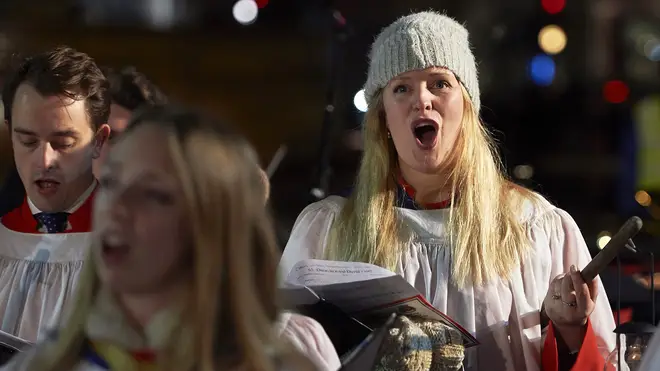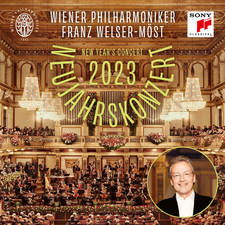Why do we sing Christmas carols?
13 December 2021, 10:10

We explore the origins, history and joy of coming together to sing Christmas songs in public settings.
Listen to this article
Nothing says “Christmas is here” quite like the melodious strains of festive music meeting our chilly eardrums. And Christmas carols especially usher in a unique warmth and joy that brighten the winter months for all.
Christmas carols are defined simply as traditional songs that celebrate the birth of Jesus Christ, sung ahead of Christmas Day. They are invariably tuneful, memorable, and magnificent.
But how did they come about, and why do we sing them? Let’s dive in…
Read more: A dive into the surprising history of the Christmas carol
Why do we sing Christmas carols?
We sing Christmas carols because they are a way of telling the story of the nativity and the birth of Jesus Christ. As well as explaining what happened around Jesus’s birth, the songs enable us to encapsulate and express the joy, devotion and awe-inspiring scenes of the nativity.
As well as telling the nativity story, Christmas carols spread joy and warmth during the coldest months of the year in the Northern hemisphere. In Christmas, the Christian faith brought together traditional winter feasts and celebrations, which were designed to spread light in the dark, deep midwinter months, and the celebrations of Jesus’s birth. Christmas carols have an appropriately uplifting and celebratory style to honour such an occasion.
And it’s no wonder they have endured as a popular way to pinpoint and celebrate the arrival of the Christmas season. Christmas carols, whether they are in a minor or a major key, almost always have wonderfully memorable melodies and captivating harmonies. Performed by choirs of voices, often with an organ or instrumentalists accompanying them, the songs boom out and resound with positivity.
Read more: The 30 greatest Christmas carols of all time

Once in Royal David's City – Chapel Choir of the Royal Hospital
What are the origins of carol singing?
In the Middle Ages, groups of ‘wassailers’ went from house to house singing for the purpose of joy-spreading and entertaining throughout the winter period.
There would have been pagan songs for Winter Solstice that predated Christian hymns but, over time, Christmas carols began to be heard more and more in the wintertime.
In the 17th century, Oliver Cromwell and the Puritans in England actually banned the singing of Christmas carols. During the English Civil War, and with his subsequent rule, Cromwell was on a mission to cleanse the nation of its most decadent excesses – and these included warming up the winter with feasts and music celebrating the birth of Jesus.
A 1644 Act of Parliament effectively banned Christmas for nearly 20 years, although people continued singing Christmas carols in secret, and it was official: barracking around and singing carols was not considered appropriate for an occasion as solemn and sacred as the birth of Jesus.
Fast forward to the Victorian era, once the Puritans were long gone, and people were collecting and singing Christmas carols once more – much like the medieval wassailers had been doing all those centuries ago.
Lyrics from popular carols we hear today, like ‘God Rest You Merry, Gentlemen’ and ‘While Shepherds Watched Their Flocks by Night’, are likely to have originated from Medieval times, but their modern melodies are Victorian.
Read more: Advent music – 10 best carols and hymns to begin the festive season

Rebecca Dale: In the Bleak Midwinter. Performed by St Martin’s Voices, under Andrew Earis
What are the origins of carol services?
The modern carol service is thought to have been invented by Edward White Benson in 1880, at Truro Cathedral in Cornwall. The cathedral was newly complete but, the story goes, its erection wasn’t particularly popular due to a popular old church and homes being demolished in its wake. In an attempt to appease his parish in the winter months, and keep parishioners away from the vices of drinking and garricking in public houses, Benson developed what became the Festival of Nine Lessons and Carols.
On Christmas Eve 1918, the famous Festival of Nine Lessons and Carols from King’s College, Cambridge was first performed, to offer solace to people at the end of the First World War. Ten years later, in 1928, it was broadcast on the radio for the very first time.
The Oxford Book of Carols, edited by Percy Dearmer, Ralph Vaughan Williams, and Martin Shaw, was also published in 1928. It created the opportunity for more people to come together for communal Christmas music-making than ever before.

The Boar's Head Carol
What is the oldest Christmas carol?
One of the first carols recorded is ‘Angels Hymn’, which is from 129 AD. By the 12th century, history records nativity themed carols being performed widely to celebrate the birth of Jesus.
And one of the oldest printed carols is the ‘Boar’s Head Carol’ (listen above), which dates from 1521. It’s believed to have been heard annually at Queen’s College, Oxford as Christmas lunch was carried in.
Classic FM is the home of Christmas music. Join us throughout December for festive programmes and traditional carols.









































